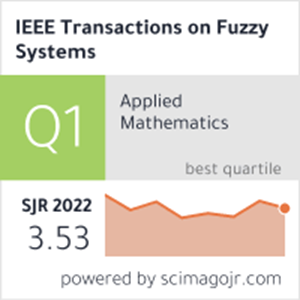Model-Free Neuro-Fuzzy Q-Learning Control With Swarm Intelligence
IF 11.9
1区 计算机科学
Q1 COMPUTER SCIENCE, ARTIFICIAL INTELLIGENCE
引用次数: 0
Abstract
In this article, a novel neuro-fuzzy-based evolution-guided Q-learning (EGQL) algorithm is established for solving the optimal control problem of unknown nonlinear systems. To enhance the accuracy for approximating the Q-function, the adaptive neuro-fuzzy inference system (ANFIS) is leveraged, which offers superior precision compared to traditional polynomial approximations commonly used in adaptive dynamic programming. Despite its advantages, the ANFIS-based approximation faces challenges in obtaining the derivative of the Q-function with respect to the control input. To address this limitation, evolutionary algorithms are integrated into EGQL, eliminating the need for gradient information by directly minimizing the Q-function values to derive optimal control strategies. This integration enables precise and robust exploration of the solution space, resulting in accurate and reliable control policies. Furthermore, convergence and monotonic improvement are ensured by the EGQL algorithm, making it suitable for uncertain and nonlinear environments. The effectiveness and superiority of the ANFIS-based EGQL algorithm are validated through simulation results. The developed algorithm achieves a 3.1% reduction in total cost compared to the traditional approach, demonstrating superior control performance.基于群体智能的无模型神经模糊q -学习控制
针对未知非线性系统的最优控制问题,提出了一种基于神经模糊的进化引导q -学习(EGQL)算法。为了提高q函数逼近的精度,利用自适应神经模糊推理系统(ANFIS),与自适应动态规划中常用的传统多项式逼近相比,它具有更高的精度。尽管基于anfiss的逼近有其优点,但在获取q函数对控制输入的导数方面面临挑战。为了解决这一限制,进化算法被集成到EGQL中,通过直接最小化q函数值来获得最优控制策略,从而消除了对梯度信息的需求。这种集成支持对解决方案空间进行精确而稳健的探索,从而产生准确而可靠的控制策略。此外,EGQL算法具有收敛性和单调性,适用于不确定和非线性环境。仿真结果验证了基于anfiss的EGQL算法的有效性和优越性。与传统方法相比,该算法的总成本降低了3.1%,显示出优越的控制性能。
本文章由计算机程序翻译,如有差异,请以英文原文为准。
求助全文
约1分钟内获得全文
求助全文
来源期刊

IEEE Transactions on Fuzzy Systems
工程技术-工程:电子与电气
CiteScore
20.50
自引率
13.40%
发文量
517
审稿时长
3.0 months
期刊介绍:
The IEEE Transactions on Fuzzy Systems is a scholarly journal that focuses on the theory, design, and application of fuzzy systems. It aims to publish high-quality technical papers that contribute significant technical knowledge and exploratory developments in the field of fuzzy systems. The journal particularly emphasizes engineering systems and scientific applications. In addition to research articles, the Transactions also includes a letters section featuring current information, comments, and rebuttals related to published papers.
 求助内容:
求助内容: 应助结果提醒方式:
应助结果提醒方式:


